|
|
|
Sort Order |
|
|
|
Items / Page
|
|
|
|
|
|
|
| Srl | Item |
| 1 |
ID:
128115
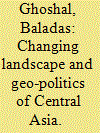

|
|
|
|
|
| Publication |
2013.
|
| Summary/Abstract |
The world may be witnessing a period of growing importance for Central Asia. It is a region where competing systems for international order are fully engages. it many will be the case that what transpires in Central Asia, i.e., competition between, international powers, will shape the future order in the region and indeed the world at large. One need not engage in far reaching geopolitical speculations regarding the future of Central Asia: it is already a political battleground for influence. This is more the sufficient reason to focus on the region to find out the emerging geopolitical trends and their implications for stability and order in the region.
|
|
|
|
|
|
|
|
|
|
|
|
|
|
|
|
| 2 |
ID:
147337
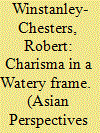

|
|
|
|
|
| Summary/Abstract |
In this article, I address North Korea both in its latent stage and the reframing of its early political narratives to support the function and authority of its current government. These narratives of nationalistic and political struggle expand across geographic boundaries and are also bound by them—hence my focus on the Tumen River. Secondarily, I consider the reframing of riverine spaces within the terrain of Pyongyang's contemporary politics, and recent examples of reenactment for commemorative purposes of historically and politically important crossings of North Korea's northern rivers. Together, these analytic elements suggest the key position of rivers in both the bounding and unbounding of North Korean history, politics, ideology, and nationhood.
|
|
|
|
|
|
|
|
|
|
|
|
|
|
|
|
| 3 |
ID:
124310
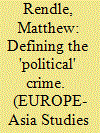

|
|
|
|
|
| Publication |
2013.
|
| Summary/Abstract |
After the October Revolution, the Bolsheviks established revolutionary tribunals to judge 'counter-revolutionary' and 'political' crimes. Amid conflicting reports from contemporaries on the effectiveness of these new courts, this essay examines their development over the first year of their existence. It argues that whilst tribunals were initially too inefficient for the regime, forcing greater central control over them, they played an important role in defining what constituted counter-revolution. In doing so, they promoted the regime's ideology, imparted an image of legality to the regime's actions, and helped the Bolsheviks to exert their control over a fragmented and diverse political landscape.
|
|
|
|
|
|
|
|
|
|
|
|
|
|
|
|
| 4 |
ID:
126660
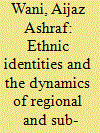

|
|
|
|
|
| Publication |
2013.
|
| Summary/Abstract |
The concept of regional and sub-regional identity as well as regional autonomy has captured the stage of Social Science. The regional autonomy aspirations and the sense of regional and sub-regional identity have offered a new dimension to the assertiveness of ethnic group. Regional identity demands in South and Southeast Asian societies have followed a uniform pattern. These regional autonomy demands evolved over a large span of time may be located in specific geographical and environmental spaces. At one level, these demands remained humane and inclusive, incorporating and reflecting broader human and universal values. At the other level, they acquired the traits of particularism which in the later stages of building multi-cultural and multi-ethnic nation states posed many problems. The plurality of politics is the hallmark of Jammu and Kashmir (J&K) State, and this polarity is essentially the result of cultural diversities that criss-cross the geographical and cultural landscape of Kashmir. The J&K State is not only a conglomerate of three distinct regions - Jammu, Kashmir, and Ladakh - but there are also regions within regions marked off from one another by geography, culture, and history. The politics of regional and sub-regionalism based on region, religion, caste, ethnicity, and so on continues to be stubbornly informed by their respective histories and cultures - thus the resistance against hegemony and the demand for sub-regional autonomies and Hill Development Councils. This article attempts at, looking into the dynamics of these assertions, its impact on the politics of the state, and to delineate the role of different socio-political and historical forces in shaping regional and sub-regional assertions in J&K without, however, suppressing the relative significance of different identity markers.
|
|
|
|
|
|
|
|
|
|
|
|
|
|
|
|
| 5 |
ID:
126661
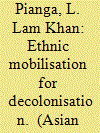

|
|
|
|
|
| Publication |
2013.
|
| Summary/Abstract |
This article attempts to communicate the methodological tension between subjectivity and objectivity by recording the aspiration of communities who are problematised both by colonialism and the modern nation-state. It highlights how colonial policy and practice contribute to the postcolonial imbroglio in Northeast India. It delineates how British colonial cartography always gave priority to 'administrative convenience' in the demarcation of boundaries, resulting in the division of ethnic community. It argues that Northeast India and the Indo-Burma borderland are not yet decolonised, as the government of India, without any rearrangement or alteration, adopts the colonial administrative boundaries, which divided ethnic communities. Neither the State Reorganisation Act (1956) nor the North-Eastern Areas (Reorganisation) Act (1971) fulfilled the aspiration of the segmented communities in the northeast, as they did in the mainland. The article also argues that the responses of the government of India towards the problems in Northeast India react to the manifested symptoms of the deep-rooted political problem rather than getting to the crux of the problem to find a solution.
|
|
|
|
|
|
|
|
|
|
|
|
|
|
|
|
| 6 |
ID:
128320
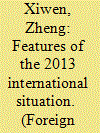

|
|
|
|
|
| Publication |
2013.
|
| Summary/Abstract |
The international situation in 2013 is on the whole stable. There is profound transformation in the world economy, deep adjustment in major-country relationships and accelerated evolvement of regional hotspots, leading to new major changes in the international political, economic and security landscapes.
|
|
|
|
|
|
|
|
|
|
|
|
|
|
|
|
| 7 |
ID:
132336
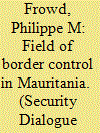

|
|
|
|
|
| Publication |
2014.
|
| Summary/Abstract |
Recent work on borders has tended to overlook border control actors, practices and rationalities in West Africa. States in this region are considered origin and transit countries for irregular migration, and the Sahel region that they straddle is widely seen as an emerging haven of terrorist activity. This article discusses one response to these migration and terrorism threats by the Islamic Republic of Mauritania: a programmme to build new border posts with help from global partners that include the European Union and the International Organization for Migration. The article builds on Bourdieusian approaches in critical security studies, but draws on concepts from actor-network theory to account for the heterogeneity of border control actors and the mobility of different knowledges about how to control borders. Drawing on ethnographic research in Mauritania, the article discusses four 'actants' of border security: the border posts, the landscape, the biometric entry-exit system and training practices. Throughout, the article highlights field dynamics of competition, cooperation and pedagogy, also emphasizing the role of non-human agency. The article concludes with a reflection on the link between border control and statebuilding, suggesting that this fusion is a broader paradigm of security provision in the global South.
|
|
|
|
|
|
|
|
|
|
|
|
|
|
|
|
| 8 |
ID:
125025
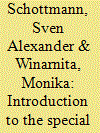

|
|
|
|
|
| Publication |
2013.
|
| Summary/Abstract |
The second half of the twentieth century witnessed the rise of what might arguably be described as political religion, with faith traditions everywhere experiencing parallels to the rise of Hindutva in India or the 'muscular' and virulently anti-minority political Buddhism of Sri Lanka and Myanmar. Similarly, Israel, a country founded by cosmopolitan, social-democratic nineteenth century perceptions of Jewish 'national' identity, is increasingly struggling with its ostensibly secular founding ethos. Religiously conservative political parties and attitudes have become mainstreamed in Israel's political landscape in the last couple of decades.1 What might help account for these seemingly similar developments, all of which appear to contradict the basic dictum of secularization theory, namely that increasingly prosperous, urban and industrialized societies will relegate religion and religious practices to the private sphere of a personal 'faith'? Until recently, the assumption persisted that the historical experience of Western Europe, the first part of the world to undergo industrialization and the wider sociocultural effects associated with the process of 'secularization', would be replicated as other parts of the world modernized. An important debate has ensued over the past 20 years or so, involving scholars representing a wide range of disciplinary backgrounds over what appears to be the revitalization of religion and even possibly processes of de-secularization.
|
|
|
|
|
|
|
|
|
|
|
|
|
|
|
|
| 9 |
ID:
128510
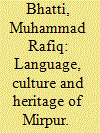

|
|
|
|
|
| Publication |
2013.
|
| Summary/Abstract |
Language, culture and heritage are the cornerstones of civilizations - ancient, medieval and present. It is very difficult to draw the lines of demarcation between languages, cultures and heritage of different regions
because these are interwoven and overlapping. Language is a medium of -expression of feelings, emotions, reason, prudence, passions and vision. Mankind since time irnmemorial has evolved different modes of expression, écalled tongues, dialects or languages. A language is a living organism, 'which originates, develops and dies. There are so many languages that have died away and are extinct now. l Culture re?ects the macro and micro behavioural structure of a society :generally accepted. All practices that people undertake, adopt or follow {consciously for their economic, social, political, moral, religious or spiritual
satisfaction come under the garb of culture. These practices, rites, rituals, =;customs, traditions, arts, architecture, food and dress etc. become part of . their individual and collective life and pass on from generation to -generation. It is a process of history and differentiates one community from other, one nation from other and one time span from the other. It is e a tree that has its roots in the past, branches in the present and shades future.
|
|
|
|
|
|
|
|
|
|
|
|
|
|
|
|
| 10 |
ID:
137205
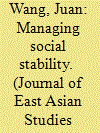

|
|
|
|
|
| Summary/Abstract |
Based on a town government's meeting memos between March 2001 and October 2007, annual work reports, and my interviews with local officials, I show that China's township governments have strived to contain, rather than resolve, social discontent. The tendency toward containment lies in two fundamental features of China's political institutions and central government strategy. First, in order to optimize the function of the petition system as a source of information without losing control, the Hu Jintao administration (2002–2012) passed regulations protecting the rights of petitioners on the one hand, and simultaneously put pressure on local officials to discourage petitioning, on the other. Second, the technical, institutional, and political features of China's cadre evaluation system encouraged local officials to take a short-term perspective on challenges, avoiding penalties rather than actually solving problems.
|
|
|
|
|
|
|
|
|
|
|
|
|
|
|
|
| 11 |
ID:
131458
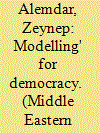

|
|
|
|
|
| Publication |
2014.
|
| Summary/Abstract |
Although Turkey has come a long way in terms of human rights since the 1980 military coup, a closer historical look inside the Turkish political scene shows us how freedom of speech was always to be sacrificed if its exercise threatened the perceived unity of the country. The article shows how decision makers' perceptions of the state as a superior institution in need of protection have shaped the practice of governing free speech in Turkey since the early years of the Republic, and introduces a unique chronology, accounting for the interaction of internal and external influences.
|
|
|
|
|
|
|
|
|
|
|
|
|
|
|
|
| 12 |
ID:
128845


|
|
|
|
|
| Publication |
2014.
|
| Summary/Abstract |
Narratives that dramatise and simplify conflicts should be corroded by exposure to complex reality. Yet they retain their mobilising power in the Middle East, topped up by conspiracy theories. To an outside observer, the picture that the Middle East conflict landscape offers is indeed complex and confusing. Littered with interlocking and overlapping conflicts, there is a wealth of narratives that allegedly explain why this is so, outlining who is the designated enemy or ally of whom, and for what reason. But when one compares the reality on the ground to these narratives, things often look quite different. In many instances, it almost seems that the conflicting parties have a distinct preference for allying not with their supposed brothers in spirit, but with their ideological opposites. The proverb 'the enemy of my enemy is my friend' seems a better guide to the Middle East conflict landscape. This raises questions about the role that narratives have played, and still play, in Middle East conflicts, and how much these stories produce or only mirror realities on the ground.
|
|
|
|
|
|
|
|
|
|
|
|
|
|
|
|
| 13 |
ID:
124773
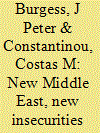

|
|
|
|
|
| Publication |
2013.
|
| Summary/Abstract |
The recent uprisings in the Middle East have highlighted - once again and in dramatic fashion - the confluence of understandings of security, representations of danger and practices of legitimation that shape our variegated geopolitical landscape. The political landscape of the Middle East is changing, and with it many of the rote certainties about how things are done or ought to be done in and with the region. Local regimes of power can no longer justify to national constituencies and international audiences the necessity of autocratic rule, states of emergency and suspension of rights. 'The West' confronts the hypocrisies and moral discounts of its own foreign policy choices, including how its definition of regional security supported the kinds of regimes, policies and human rights violations that Western states traditionally define themselves against.
|
|
|
|
|
|
|
|
|
|
|
|
|
|
|
|
| 14 |
ID:
137198
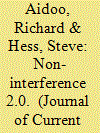

|
|
|
|
|
| Summary/Abstract |
China’s non-interference policy has come under scrutiny in regards to its growing and deepening relations in Africa. The policy has come to represent an about-face from conditional assistance and investment associated with the Washington Consensus. Although often well received in much of the global South, this policy has drawn a lot of criticism from the West and others. These commentators have perceived non-interference as an opportunistic and often inconsistent instrument for enabling China’s increasing access to African resources and markets. This article suggests that despite some consistent support for the rhetoric of non-interference, China’s implementation of the policy has become increasingly varied and context-ualized in reaction to Africa’s ever-more diversified political and economic landscape since the early 2000s.
|
|
|
|
|
|
|
|
|
|
|
|
|
|
|
|
| 15 |
ID:
129571
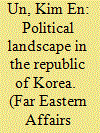

|
|
|
|
|
| Publication |
2014.
|
| Summary/Abstract |
The parliamentary and presidential elections held in the republic of Korea in 2012 led to a significant realignment of political forces in the country. The neoconservatives suffered a heavy defeat, and the opposition rallied its forces, if even for a while. The inauguration of the new president set off gradual reforms in the economy and social services. The new political landscape is also influencing the relations between the two Koreas, already showing signs of a breakthrough.
|
|
|
|
|
|
|
|
|
|
|
|
|
|
|
|
| 16 |
ID:
133640


|
|
|
|
|
| Publication |
2014.
|
| Summary/Abstract |
Two of Eastern Europe's bravest dissidents on the temptation of disillusionment after liberation saw a wave of greed, corruption, hedonism and cynicism.
WHAT HAPPENS to revolutionaries after the revolution? If the revolution fails, the answer is easy: they end up in exile, in prison or dead. But what if the uprising succeeds? Then the answer is more complicated. Successful rebels scatter across the political landscape, with former brothers-in-arms often becoming fierce enemies-professional radicals on one side, upholders of the new status quo on the other.
|
|
|
|
|
|
|
|
|
|
|
|
|
|
|
|
| 17 |
ID:
137199
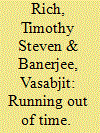

|
|
|
|
|
| Summary/Abstract |
This article highlights the precarious nature of Taiwan’s diplomatic relations in Africa. Whereas Cold War rationales initially benefitted Taiwan, economic interests now appear to incentivize African countries to establish relations with China. Through qualitative and quantitative data covering much of the post-World War II era, this analysis argues that economic factors have trumped political ration-ales for Taiwanese–African relations. In addition, this article prob-lematizes both conceptions of diplomatic recognition and Taiwan’s enduring relations with Africa.
|
|
|
|
|
|
|
|
|
|
|
|
|
|
|
|
| 18 |
ID:
124402
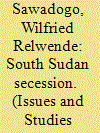

|
|
|
|
|
| Publication |
2013.
|
| Summary/Abstract |
The political landscape of Sudan, the former largest country of Africa in terms of territory, has witnessed a dramatic change with the January 2011 referendum in South Sudan followed by the official division of the country into two separate independent entities on July 9, 2011, thereby sealing the fate of North and South Sudan. Such a situation presents crucial challenges not only to warring forces in war-driven Darfur but also to major foreign investors such as China; hence the relevance of this paper that seeks to first provide an in-depth analysis of the role of Sudan in Beijing s foreign policy prior to South Sudan s secession before examining the implications that South Sudan s secession might have on the one hand, on the Darfurian political stance towards the Al-Bashir regime and, on the other hand, on Chinese strategic policy options vis-à-vis the region.
|
|
|
|
|
|
|
|
|
|
|
|
|
|
|
|
| 19 |
ID:
142869
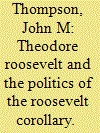

|
|
|
|
|
| Summary/Abstract |
There is a broad consensus about the ways in which public opinion and domestic politics influenced American foreign policy during Theodore Roosevelt’s presidency. Historians generally concur that the American public was ignorant about and uninterested in international politics. They also agree that the president’s perception of public sentiment and his reading of the political landscape played essentially negative roles; that is, they were constraints at the point of implementation, rather than factors that shaped the substance of his policy, and were unquestionably a hindrance. Taking a fresh look at the origins of the Roosevelt Corollary to the Monroe Doctrine raises questions about this interpretation. Roosevelt believed that Americans were passionately opposed to the blockade of Venezuela by European Powers in late 1902 and early 1903 and viewed it as a threat to the Monroe Doctrine. This perception and Roosevelt’s 1904 presidential campaign therefore significantly affected the timing and content of the Roosevelt Corollary.
|
|
|
|
|
|
|
|
|
|
|
|
|
|
|
|
| 20 |
ID:
128989
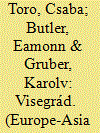

|
|
|
|
|
| Publication |
2014.
|
| Summary/Abstract |
Multilateral, subregional partnerships are one of the defining features of contemporary European politics. The 2004 enlargement of the European Union introduced a new partnership entity to the mix-the Visegrád Group of states, comprising the Czech Republic, Hungary, Poland and Slovakia-which offers its members a useful model to discuss and represent common interests in a collective manner within the regional and international political landscape. The article provides a reflection on the evolution of the Visegrád Group of states since 2004. It examines four key policy areas (institutional candidacy, energy policy, eastern neighbourhood and defence policy) where the group has either learned some difficult lessons or is seeking to apply those lessons. The article suggests that the Visegrád Group's greatest strength lies in its flexibility to become more responsive to the challenges it faces and it is likely therefore to remain appealing to its member states and to be a permanent feature within the wider cohort of European Union subregional partnerships.
|
|
|
|
|
|
|
|
|
|
|
|
|
|
|
|
|
|
|
|
|